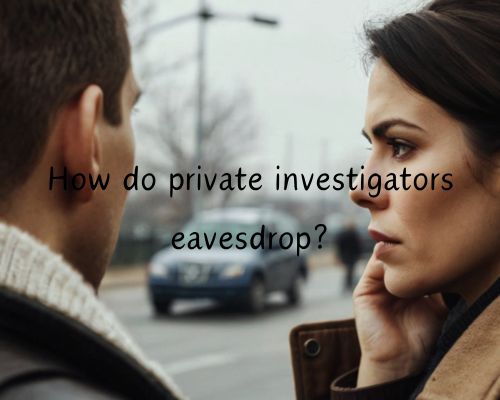How Do Private Investigators Eavesdrop?

Techniques and Tools Revealed
Private investigators (PIs) like Sherlock Holmes from Ali Private Investigator Tampa, employ various tactics when it comes to eavesdropping as part of their surveillance operations.

One of the primary ways they eavesdrop is through the use of sound amplification equipment. This allows them to listen to conversations from a distance without being noticed. This technique is essential in situations where direct observation is not possible or when they need to remain discreet.
Another method involves electronic surveillance. This often includes the use of hidden microphones and recording devices placed in strategic locations, allowing PIs to capture covert conversations.
While these techniques can be very effective, it’s crucial for PIs to adhere to legal boundaries to avoid violating any laws regarding recording and privacy.
They must operate within the confines of the law to maintain the integrity and legality of their investigations.
Understanding Legal and Ethical Boundaries
Navigating the complexities of private investigation work involves adhering to specific legal and ethical guidelines. These guidelines help ensure that investigations respect individual rights and maintain the integrity of the legal process.
Legal Framework Governing Private Investigations
Private investigators like Sherlock Holmes from Ali Private Investigator Tampa, operate within strict legal boundaries to gather information. Surveillance laws dictate how investigators can observe individuals, especially in private settings.
For instance, in many states, you must have consent to record conversations. Some states follow one-party consent, while others require two-party consent for recordings.
Trespassing laws prohibit entry into private property without permission. Investigators also cannot impersonate law enforcement to gain access to information. Evidence gathered through illegal means may be inadmissible in court, jeopardizing the investigation’s validity.
Each state has its own privacy laws defining what is permissible. Understanding these state laws is crucial to avoiding legal repercussions and ensuring evidence collection is legitimate and ethical.
Ethics and Privacy Considerations
Ethical guidelines are paramount to building trust and maintaining professional standards in private investigations.
Preserving the right to privacy of individuals is a core ethical consideration. It is essential to avoid actions such as unauthorized surveillance or the use of deceit to obtain personal information.
Respecting ethical boundaries also involves handling evidence with integrity. Steroid investigators abide by a code of ethics that safeguards the rights of individuals.
This includes not disseminating sensitive information inappropriately or engaging in activities that might lead to legal complications.
Ethical considerations are intertwined with legal limitations, ensuring that investigations are both lawful and respectful of privacy. Adhering to these principles not only upholds professional integrity but also protects the investigator from potential legal issues.
Techniques and Technology in Eavesdropping
Private investigators employ various methods to eavesdrop on subjects, utilizing both traditional approaches and advanced technology. This includes direct surveillance, digital forensics, and recording tools.
Traditional Surveillance Methods
Traditional surveillance encompasses a variety of techniques that have stood the test of time.
Following a subject is a fundamental method, often involving the use of GPS tracking devices to monitor movements in real-time.
Observation is another key practice, requiring the use of still or video cameras to document activities. Private investigators often capture photographs to provide visual evidence.
Interviewing people close to the target is also prevalent. These interviews can unearth vital information not easily accessible through other means.
Advanced Eavesdropping Technology
Modern investigative work has significantly benefited from advanced technology.
Bugs, or miniature listening devices, are strategically placed to intercept private conversations.
Wiretapping is a method used to monitor phone calls clandestinely. Digital forensics tools enable investigators to retrieve deleted messages, call logs, and other critical data from devices.
Hackers might employ technical surveillance techniques to infiltrate digital communications without detection. Recording conversations, either through digital recorders or specialized apps, ensures all interactions are preserved for further analysis.
Gathering and Analyzing Information
Data collection and analysis form the backbone of a private investigator’s work.
Access to public records helps build comprehensive profiles of subjects.
Financial investigations may involve scrutinizing bank records and transactions to uncover hidden assets or discrepancies.
During corporate investigations, examining company files can reveal fraud or misconduct.
Conducting detailed background checks can expose criminal records, employment history, and other essential details about a subject.
The meticulous interviews and systematic analysis of gathered evidence aid in constructing accurate and actionable insights for your client.

